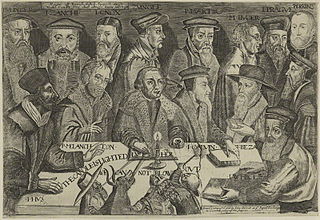The free offer of the Gospel, sometimes called the well-meant offer of the gospel, in Christian theology, is the offer of salvation in Jesus Christ to all people. It is generally accepted by Calvinists, but rejected by a few small Reformed denominations, such as the Evangelical Presbyterian Church in Australia, [1] the Protestant Reformed Churches in America, the Reformed Congregations in the Netherlands (Dutch: Gereformeerde Gemeenten in Nederland, abbreviated GGiN) [2] [ circular reference ] [3] [ circular reference ] and also by some English Strict Baptists of longer standing, such as John Gill and, later, the Gospel Standard Strict Baptists.
The free offer of the Gospel was a point that the Marrow Brethren sought to defend, seeing the high Calvinists who denied the doctrine as misguided. [4]

Arminianism is a movement of Protestantism initiated in the early 17th century, based on the theological ideas of the Dutch Reformed theologian Jacobus Arminius and his historic supporters known as Remonstrants. Dutch Arminianism was originally articulated in the Remonstrance (1610), a theological statement submitted to the States General of the Netherlands. This expressed an attempt to moderate the doctrines of Calvinism related to its interpretation of predestination.

Reformed Christianity, also called Calvinism, is a major branch of Protestantism that began during the sixteenth-century Protestant Reformation, a schism in the Roman Catholic Church. Today, it is largely represented by the Continental Reformed, Presbyterian, Reformed Anglican, Congregationalist, and Reformed Baptist denominational families.

Predestination, in theology, is the doctrine that all events have been willed by God, usually with reference to the eventual fate of the individual soul. Explanations of predestination often seek to address the paradox of free will, whereby God's omniscience seems incompatible with human free will. In this usage, predestination can be regarded as a form of religious determinism; and usually predeterminism, also known as theological determinism.

Perseverance of the saints is a Christian teaching that asserts that once a person is truly "born of God" or "regenerated" by the indwelling of the Holy Spirit, they will continue doing good works and believing in God until the end of their life.

In Western Christian theology, grace is created by God who gives it as help to one because God desires one to have it, not necessarily because of anything one has done to earn it. It is understood by Western Christians to be a spontaneous gift from God to people – "generous, free and totally unexpected and undeserved" – that takes the form of divine favor, love, clemency, and a share in the divine life of God. In the Eastern Orthodox Church, grace is the uncreated Energies of God. Among Eastern Christians generally, grace is considered to be the partaking of the Divine Nature described in 2 Peter 1:4 and grace is the working of God himself, not a created substance of any kind that can be treated like a commodity.

Arthur Walkington Pink was an English Bible teacher who sparked a renewed interest in the exposition of Calvinism or Reformed Theology. Little known in his own lifetime, Pink became "one of the most influential evangelical authors in the second half of the twentieth century."

Reformed Baptists, Particular Baptists and Calvinistic Baptists, are Baptists that hold to a Calvinist soteriology. Depending on the denomination, Calvinistic Baptists adhere to varying degrees of Reformed theology, ranging from simply embracing the Five Points of Calvinism, to accepting a modified form of federalism; all Calvinistic Baptists reject the classical Reformed teaching on infant baptism as a sign and seal of the covenant of grace. The first Calvinistic Baptist church was formed in the 1630s. The 1689 Baptist Confession of Faith is a significant summary of the beliefs of Reformed Baptists. The name "Reformed Baptist" dates from the latter part of the 20th century to denote Baptists who retained Baptist ecclesiology, and reaffirmed more historic Baptist biblical theology, such as Covenant theology.
Primitive Baptists – also known as Regular Baptists, Old School Baptists, Foot Washing Baptists, or, derisively, Hard Shell Baptists – are conservative Baptists adhering to a degree of Calvinist beliefs who coalesced out of the controversy among Baptists in the early 19th century over the appropriateness of mission boards, tract societies, and temperance societies. Primitive Baptists are a subset of the Calvinistic Baptist tradition. The adjective "primitive" in the name is used in the sense of "original".

Irresistible grace is a doctrine in Christian theology particularly associated with Calvinism, which teaches that the saving grace of God is effectually applied to those whom he has determined to save and, in God's timing, overcomes their resistance to obeying the call of the gospel, bringing them to faith in Christ. It is to be distinguished from prevenient grace, particularly associated with Arminianism, which teaches that the offer of salvation through grace does not act irresistibly in a purely cause-effect, deterministic method, but rather in an influence-and-response fashion that can be both freely accepted and freely denied.
Hyper-Calvinism is a branch of Protestant theology that places strong emphasis on supralapsarianism, or salvation from eternity, where the atonement of Christ was and is difficult for the non-elect to understand, where man has little to do with his salvation, there being nothing man can do to resist being saved, wherein evangelism was given lower emphasis as compared to traditional Calvinism, and where assurance of salvation was felt within a person, identified by introspection.

John Gill was an English Baptist pastor, biblical scholar, and theologian who held to a firm Calvinistic soteriology. Born in Kettering, Northamptonshire, he attended Kettering Grammar School where he mastered the Latin classics and learned Greek by age 11. He continued self-study in everything from logic to Hebrew, his love for the latter remaining throughout his life.

Andrew Fuller was an English Particular Baptist minister and theologian. Known as a promoter of missionary work, he also took part in theological controversy.
Eternal security, also known as "once saved, always saved", is the belief providing Christian believers with absolute assurance throughout their lives of their inevitable salvation. The term has been also used as a synonym for doctrines that offer theoretical security to the predetermined elect without guaranteeing absolute assurance to all believers. It typically aligns with forms of theological determinism, whether fully or partially. Eternal security is a characteristic doctrine of the Southern Baptist traditionalism. It is held in Calvinist circles and by the Plymouth Brethren. It is also held in the Free Grace movement and in the "Hyper-Grace" movement.

Amyraldism is a Calvinist doctrine. It is also known as the School of Saumur, post redemptionism, moderate Calvinism, or hypothetical universalism. It is one of several hypothetical universalist systems.

Unlimited atonement is a doctrine in Protestant Christianity that states Jesus died as a propitiation for the benefit of all humans without exception. It is normally associated with Amyraldism, as well as Arminianism and other non-Calvinist tradition. It is a doctrine distinct from other elements of the Calvinist acronym TULIP and is contrary to the Calvinist doctrine of limited atonement.

The history of the Calvinist–Arminian debate begins in early 17th century in the Netherlands with a Christian theological dispute between the followers of John Calvin and Jacobus Arminius, and continues today among some Protestants, particularly evangelicals. The debate centers around soteriology, or the study of salvation, and includes disputes about total depravity, predestination, and atonement. While the debate was given its Calvinist–Arminian form in the 17th century, issues central to the debate have been discussed in Christianity in some form since Augustine of Hippo's disputes with the Pelagians in the 5th century.

Reformed Christianity originated with the Reformation in Switzerland when Huldrych Zwingli began preaching what would become the first form of the Reformed doctrine in Zürich in 1519.
New Calvinism, also known as the Young, Restless, and Reformed Movement, is a movement within conservative Evangelicalism that reinterprets 16th century Calvinism under contemporary US values and ideologies.

Joseph Hussey (1660–1726) was an English Calvinist and congregationalist minister.